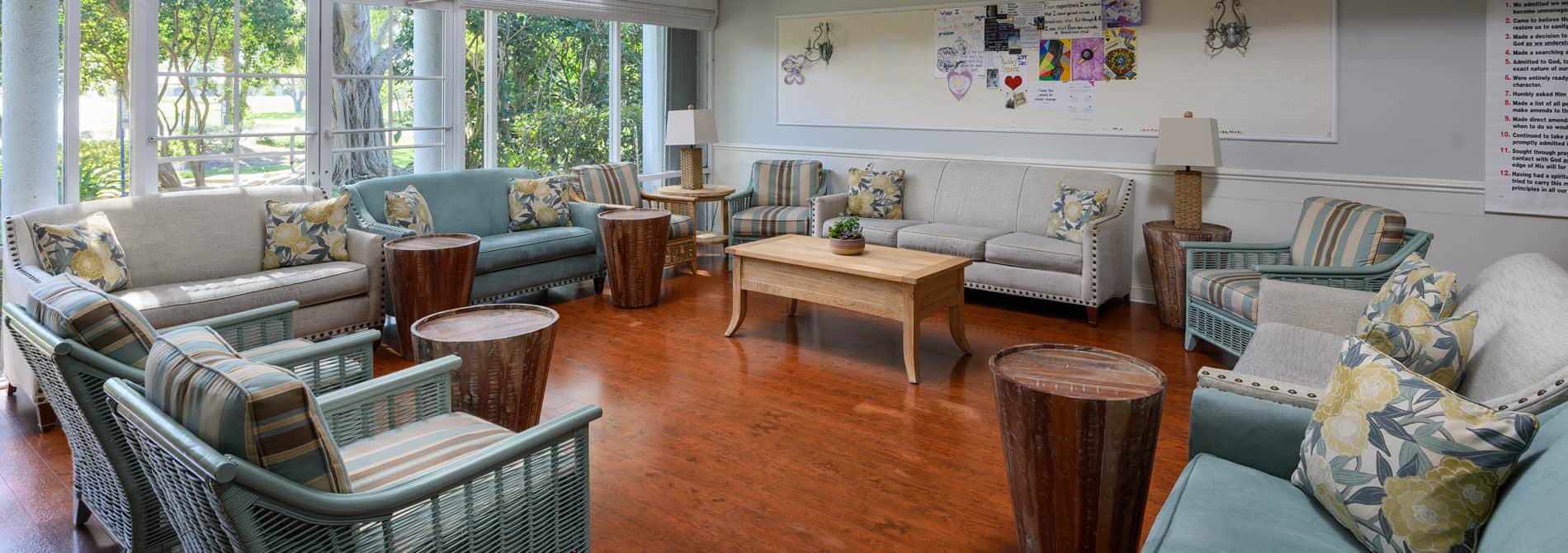Choosing residential treatment should never be left to a quick decision. There are a lot of important steps involved. You want to make a choice that’s most aligned with you and your needs. We came up with a list of six areas to help you focus on as you’re considering your treatment options.
With so many options in residential addiction treatment centers, choosing the right one can seem challenging. Finding one that’s both effective and suited to your needs and tastes can start with looking at a short list of important factors. Whether you’re calling them or visiting websites, you should look first at the facility’s license and accreditation information. Reviewing each one’s treatment options and services is another essential step. The level of privacy and a list of amenities, such as gender-specific residences, should be part of the decision-making, too. For some people, a scenic location may be a personal preference and a final deciding factor in choosing a residential treatment facility.
If you or a loved one need help, call our admissions team today at 561-841-1033.6 Things to Look for in a Residential Addiction Treatment Center
1. Licenses and Accreditation
Not all licensing at residential treatment centers is the same. This is an area that sets leaders apart from the rest. The licensing information for any facility should always be visible and verifiable.
Hanley Center is licensed by the Florida Department of Children and Families. The licensed levels of care cover five distinct areas. They are Inpatient Detoxification, Residential Level 1, Day or Night Treatment with Community Housing, Day or Night Treatment, and Intensive Outpatient.
Accreditation Through CARF (Commission on Accreditation of Rehabilitation Facilities) is another sign of a commitment to excellence. Hanley Center holds the
Three-Year CARF Accreditation in six categories. They are Detoxification/Withdrawal Support: Alcohol and Other Drugs/Addictions (Adults), Residential Treatment: Alcohol and Other Drugs/Addictions (Adults), Residential Treatment: Alcohol and Other Drugs/Addictions (Older Adults), Day Treatment: Alcohol and Other Drugs/Addictions (Adults), Intensive Outpatient Treatment: Alcohol and Other Drugs/Addictions (Adults), and Community Housing: Alcohol and Other Drugs/Addictions (Adults).
2. Treatment Center Services
Effective residential treatment involves a variety of services for each patient. These services also meet the needs of different types of patients. You’ll want a program that’s aligned with your needs or the needs of a loved one with services already in place.
At Hanley Center, treatment services cover any type of substance use disorder, including alcohol, opioids, and marijuana. Programs are designed by age group, too, as a way to help patients connect with peers during their recovery. Dual diagnosis treatment is available for patients with co-occurring depression, anxiety, trauma or other mental health concerns. Detoxification and ongoing medical services are available to patients to ensure a safe withdrawal and monitoring of any chronic conditions. Continuing care is another important service to help patients create a lifelong recovery plan.
3. Location: Beach for Healing
It may be surprising, but the location of residential addiction treatment can be another decisive factor in someone’s level of commitment to a program. Outside of structured activities, patients can benefit from time spent in unstructured and relaxing settings. These may be the places they reflect on what they’re learning, read a book, or just enjoy a scenic escape.
At Hanley Center, a beach for healing becomes a destination for patients for any number of reasons. Its tranquility is appealing for some people. Others may be drawn to it for some tactile time on the sand. For everyone, it can feel like a glimpse of what staying sober can make possible in the future: time at a dream destination.
4. Privacy
Working on your recovery is already a demanding experience. It’s more challenging when you’re working on it in a public way. Other people seeing you going in and out of meetings may make you feel exposed. The privacy aspect of a residential treatment program is important. You become less distracted by the outside world and able to focus on the work needed to take your next steps in recovery.
Hanley Center provides a private setting for clients who are in treatment for substance use and SUDs and co-occurring mental health disorders. Privacy also extends to the care of a patient. Each patient at Hanley Center is assigned an Admissions Specialist who facilitates the treatment journey. Private details remain private and a patient’s information remains confidential beyond the authorized members of their treatment team.
5. Addiction Treatment Center Amenities: Gender-specific Residences
Alcohol and drugs affect women and men differently. Their reasons for using substances can also show up differently. In a gender-specific setting, women can focus on their healing in a safe space with other women who may share some of the same reasons for drug and alcohol use. For men, especially ones who lack healthy relationships with other men, the focus on learning how to build a community of peers is important. Both men and women may see a pattern in their old behaviors and use the opportunity to create balanced connections.
At Hanley Center, the gender-specific treatment is a standard part of the design of each program. Men in male residences receive care from a multidisciplinary team of male professionals. Women receive care from a multidisciplinary team of female professionals.
6. Treatment Options
Drug and alcohol treatment may get the most attention upfront, but a multi-layered program offers a whole lot more. The education on drug and alcohol use gets accompanied by learning how to create healthy relationships with peers. Patients learn to express emotions and manage their anger. Treatment for unresolved trauma helps patients understand how experiences of their past still affect them today.
An exceptional residential addiction treatment facility introduces other interventions to help patients on the road to recovery. Psychological testing and cognitive-behavioral therapy (CBT) can be part of a dual diagnosis treatment for patients who have attempted recovery many times before and relapsed. Meditation and mindfulness training are strategies for a patient to learn and practice during treatment, too. In combination, these treatment options (and others) can help you or a loved one build self-awareness and acquire the skills it takes to stay sober longer.
Hanley Center is a well-known care provider offering a range of treatment programs targeting the recovery from substance use, mental health issues, and beyond. Our primary mission is to provide a clear path to a life of healing and restoration. We offer renowned clinical care and have the compassion and professional expertise to guide you toward lasting recovery.
For information on our programs, call us today: 561-841-1033.




